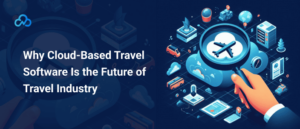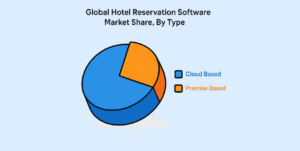Why Cloud-Based Travel Software Is the Future of the Travel Industry

The travel industry has undergone seismic changes in recent years, driven by digital innovation, shifting consumer behavior, and global events such as COVID-19. As a result, businesses must restructure their operations, with cloud-based travel software emerging as a key enabler of this transformation.
Personnel working in booking management and customer relationship maintenance, together with reservations, need to abandon their traditional processes because new ways have already taken over. Modern travelers require immediate confirmation services together with various customized suggestions and smooth communication channels. Mandatory software requirements for travel companies include systems that remain agile while making service and market trend adaptation capabilities accessible.
The growing market competition, together with changing customer expectations, demands flexible, scalable tools from companies to maintain future security. Cloud solutions provide total advantages, including real-time data visualization as well as protected data storage and automatic processing.
Cloud-Based vs. Premise-Based: Market Shift in Hotel Reservation Software
Cloud-based hotel reservation software is quickly becoming the go-to choice for travel businesses. According to recent market data, cloud solutions are pulling ahead of traditional on-premise systems in a big way. Why? Because they’re more flexible, easier to scale, and way more affordable.
Real-Time Access From Anywhere
Through cloud software, users can access their tools and data at all times, whenever they need to perform tasks from virtually anywhere, because cloud software provides data access. Cloud software eliminates two major problems by offering modern apps that allow workers to access tools and maintain operations through any internet connection.
This technological advancement proves essential for travel agents performing their jobs across multiple locations and diverse time differences. Your sales team deals with bookings directly from Bali beaches, while your customer service agents operate freely during off-hours through software from anywhere.
The adaptability provided by modern technology increases both team efficiency and enables self-dependent work while speeding up response delivery times needed in fast-moving competitive industries that demand immediate action.
Scalability That Grows With You
Travel businesses are not static. The business will experience periods when it handles just a few clients before moving on to group bookings for international events and time zone management for multiple vendors. Due to the dynamic, unpredictable nature of the travel business, the required technological responses must be equally fast-paced.
Software systems experience difficulties when coping with changes in demand frequency. Manual upgrades combined with additional servers and IT support costs increase the expenses significantly when scaling business operations, while these changes take time, mostly affecting small businesses with limited budgets.
Cloud-based travel software shows built-in scalability because of how it functions. Users can effortlessly add new users and expand features and storage without needing hardware replacements or technical complexities. Cloud technology expands according to your business requirements at any company size, up to enterprise-level scale.
During peak seasons and urgent promotional events, this capability allows businesses to grow their operations easily when booking demands surge. The increased usage levels your system experiences do not affect its operation or cause failures because it handles high workloads effectively, which creates a continuous service for team members and users. Such system reliability brings about better service quality, which results in higher revenue and reduced operational stress.
Cost-Effective and Budget-Friendly
Travel companies used to require significant advance spending on servers and IT personnel, along with server maintenance costs. The expenses grew fast, which made premium software solutions unavailable for many small businesses to purchase.
Cloud solutions flip this model. Businesses that work with these systems pay only for the amount of service they use through subscription payments. Many companies do not need to concern themselves with hardware improvements or unpredictable maintenance costs. The established pricing structure enables better resource management by helping companies set budgets and optimize their money distribution.
The software provider takes charge of automatic updates while granting users the latest features at no additional cost and without disruption.
Enhanced Collaboration With Travel CRM
Enable customer management through the travel CRM (Customer Relationship Management) system to efficiently run a contemporary travel operation. The system achieves elevated strength when integrated within a cloud platform.
Modern cloud-based travel CRM systems consolidate both customer information and their booking history alongside their preferences, along with their entire communication activity. A real-time availability of up-to-date information is accessible to sales staff all the way through to support representatives. Staff members avoid the tedious task of examining emails alongside spreadsheets to find past reservations or client room requirements.
Cooperative work between departments results in unique customer treatment that develops loyalty between the business and its clients. The data analytics supplied by cloud CRMs allows you to detect market patterns and anticipate customer actions for making decisions that drive business expansion.
Seamless Integration With Hotel Reservation Software
Hotel reservation software represents an essential part of producing effective travel software solutions. Through cloud-based systems, users can easily establish integrations between booking engines and property management systems as well as third-party platforms.
All data about hotel room availability, together with prices and bookings, stays updated due to integrated systems. Travel agents provide real-time room booking services to their clients without facing double bookings or displaying inaccurate information through this system.
Hotel operations benefit from travel software through reduced mistakes and superior inventory control that creates better guest satisfaction. The integration allows travel agencies to perform better operations which resulting in contented guests.
Faster Innovation and Customization
The travel industry develops at a consistent pace. Fast adjustments become necessary for businesses because new business models intersect with customer expectations and increasing regulations. Platforms that exist in the cloud framework excel at adapting to changes.
The implementation of a customer support chatbot appears necessary for your operations. A new loyalty program demands implementation. Looking to automate itinerary creation? Cloud travel software enables organizations to deploy new features along with strategy tests, which retain essential operations unaffected.
Companies can pick and choose components from platform modules that suit their business requirements. Business organizations maintain leadership advantages because they can constantly innovate through this adaptable feature set.
Data Security and Compliance
The travel business constantly deals with the management of private information. Travel companies obtain multiple types of private information, including passport details, together with visa documents and credit card numbers, as well as personal customer preferences. Protecting collected sensitive data requires a serious commitment because data breaches and leaks, and unauthorized access remain constant threats.
A single incident of data breach results in damaged reputation and legal consequences while destroying customer trust. Businesses must select the ideal technology because performance depends on it, but security becomes equally important.
Cloud service providers spend too much money on advanced security standards because they comprehend the dangers better than independent companies can handle. End-to-end encryption and multi-factor authentication, together with firewall safeguards and regular automated backup services, constitute standard components in most cloud-based travel software solutions.
The top-tier cloud travel platforms use compliance-centered design along with technical defense systems. Such systems protect your business from all required legal obligations under the GDPR European law and local data regulation standards.
Cloud solutions that combine security and compliance allow businesses to keep their systems safe while simultaneously sending a signal of serious privacy protection to their clients in this digital-first era.
Automatic Updates and Minimal Downtime
Software installations based on traditional methods require users to perform all updates manually, which frequently extends into lengthy periods and carries potential safety risks. Cloud-based systems maintain automatic background updates, which provide users with the most secure and efficient version of the program without disrupting their operation.
Updated versions can be managed without bugs through a system that delivers better performance while minimizing system downtime. Travel operates at such a fast pace that essential reliability surpasses being merely convenient in the industry.
Better Customer Experience
The travel agency centers its operations on customer needs and requirements. Modern traveling customers require access to quick services that deliver their requirements and utilize efficient customer service. Your organization can reach these three traits through implementing cloud-based travel software.
Travel software delivers instant confirmation alongside live alerts that work with user-friendly mobile interfaces, which provide customized suggestions to enhance user experiences. Your team reaches optimal performance by implementing backend system functions that create powerful memories in client experiences.
Supporting Remote Work and Global Teams
Business operations have undergone fundamental changes because of remote work, and now these changes impact the entire travel industry. Many agencies now employ remote travel advisors or partner with international freelancers and vendors. The capability to work remotely comes from cloud-based travel software systems.
Every member of the team can use a centralized system to conduct effortless collaboration, no matter how many continents they span. A cloud-based system allows clients to access documents and view booking tracking, as well as receive service through shared documents, despite team members working remotely.
Operational costs decrease and new markets emerge because of this worldwide operational flexibility.
Sustainability Through Digital Transformation
Cloud-based solutions play an important, unappreciated role in sustainable business practices. Cloud travel software reduces your business’s environmental impact through two primary actions of paper elimination and workflow optimization, and minimized infrastructure requirements.
Future-Proofing Your Business
Technology changes fast. Current tools will become useless in the forthcoming years. Both existing and emerging technologies can be supported by Cloud-based travel software to ensure forward compatibility with AI and voice search, as well as blockchain.
Cloud platforms simplify the process of integrating innovations that become standard practice for your current systems. Traditional software constraints cannot bind you because cloud-based travel systems provide you freedom to upgrade.
FAQs
1. What is cloud-based travel software?
The cloud-based travel software functions as a digital remote server solution through which travel businesses handle bookings and customer relationships and make reservations via the internet. This technological solution provides virtual time access along with automatic system updates and delivers more flexible operations than standard onsite software solutions.
2. How does travel CRM help improve customer service?
Travel CRMs maintain all customer information and booking records, and preferences through one unified system. A travel CRM enables personalization of client communication while providing quick responses to inquiries and delivering customized travel services, which enhances travel agent-client satisfaction and loyalty.
3. Why should travel businesses switch to hotel reservation software in the cloud?
Cloud-based hotel reservation software allows real-time management of inventory while it prevents overbookings through easy connection to travel agencies and OTAs. The system enables more efficient operations, and it enhances both guest experiences and supports staff and partner remote access.
4. Is cloud-based travel software secure for handling customer data?
Reputable cloud travel software providers install security protocols that include encryption protocols and regular backup systems, together with multi-factor authentication features. The platforms operate within GDPR and other data protection laws to provide secure and confidential storage of customer data.
Conclusion: Embrace the Cloud or Get Left Behind
The travel sector exists now as a modern operation without physical headquarters and manual procedures or isolated systems. The industry now operates through principles like augmented agility and personalized customer interactions supported by technical systems. Travel software based in the cloud acts as the main driver of this transformation.
A broad number of businesses migrate to cloud solutions because these systems provide them with real-time access and integration capabilities, together with improved experiences and enhanced security measures.
A cloud-based platform represents the future of business operations through which you can enhance your travel CRM systems and improve hotel reservation software, and secure your travel business against future uncertainties. Every business needs to decide when it will transition to cloud-based solutions rather than questioning the necessity of such a shift.
Do you like to read more educational content? Read our blogs at Cloudastra Technologies or contact us for business enquiry at Cloudastra Contact Us.
